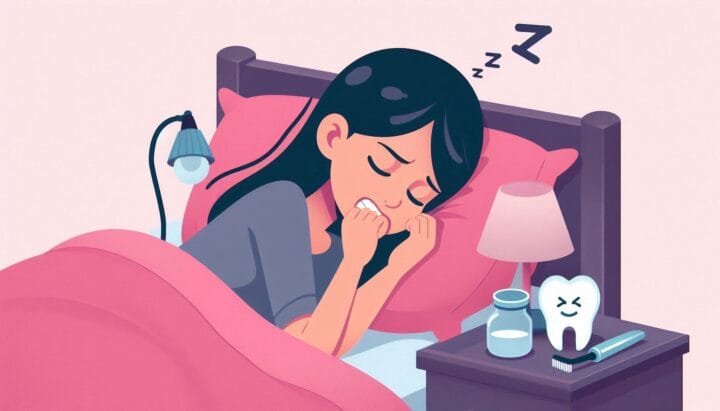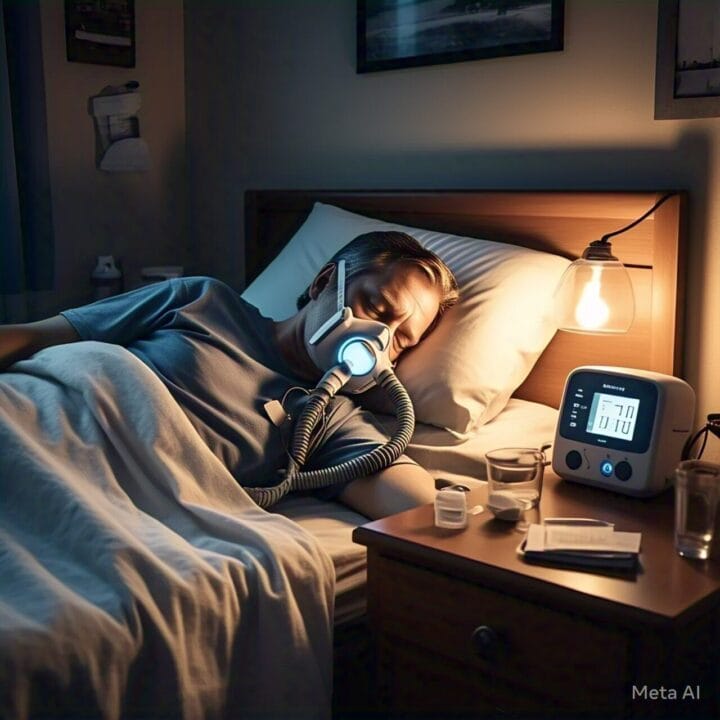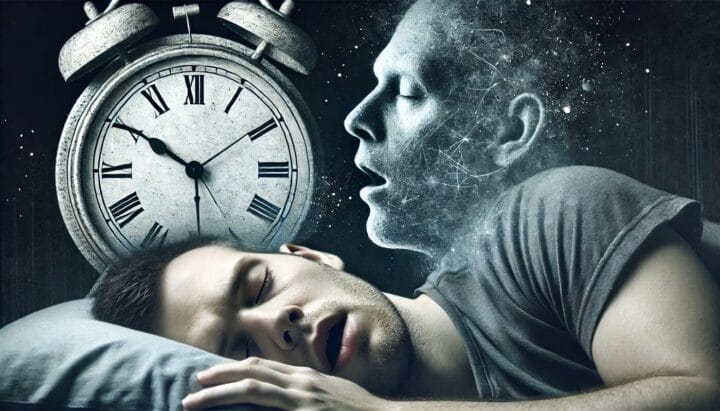Bruxism and Sleep Apnea: The Hidden Connection Revealed
Table of Contents

Bruxism and Sleep Apnea: When Teeth Grinding Meets Troubled Breathing
Ever woken up with a sore jaw and a headache, feeling like you’ve been chewing rocks all night? Or has your partner complained about your snoring that could wake the dead? You might be dealing with bruxism and sleep apnea – two sleep disorders that often go hand in hand. Let’s dive into this nocturnal duo and see how they’re connected.
The Nighttime Nemeses: Bruxism and Sleep Apnea Explained
Bruxism and sleep apnea are like unwelcome bedtime buddies. One grinds your teeth, the other stops your breathing. But how are they related?
Bruxism: The Tooth Grinder’s Tale
Bruxism is a fancy word for grinding or clenching your teeth, usually while you sleep. It’s like your jaw decides to hit the gym at 2 AM, and your teeth are the unwilling participants. Symptoms include:
- Worn-down teeth
- Jaw pain
- Headaches
- Earaches
- Facial pain
Sleep Apnea: The Breath Thief
Sleep apnea, on the other hand, is when you stop breathing for short periods during sleep. It’s like your airway decides to play hide and seek, but forgets to come back. Signs of sleep apnea include:
- Loud snoring
- Gasping for air during sleep
- Daytime fatigue
- Morning headaches
- Difficulty concentrating
The Twisted Tango: How Bruxism and Sleep Apnea Dance Together
Now, you might be wondering, “What do teeth grinding and breathing problems have in common?” More than you’d think! These two conditions often occur together, creating a vicious cycle that can wreak havoc on your sleep and overall health.
The Chicken or the Egg?
It’s not always clear which comes first – bruxism or sleep apnea. Some researchers believe that bruxism might be a way for your body to reopen your airway during a sleep apnea episode. It’s like your jaw is trying to be the hero, clenching and grinding to keep your airway open. Others think sleep apnea might trigger bruxism as a stress response. Either way, they’re often found in the same bed, so to speak.
The Domino Effect
When these two team up, it’s bad news for your sleep quality. Sleep apnea disrupts your sleep cycle, which can increase stress and tension – prime conditions for bruxism. Meanwhile, bruxism can worsen sleep apnea by causing inflammation in the throat and jaw muscles. It’s like a never-ending game of ping pong in your mouth and throat.
Spotting the Signs: Are You a Victim of the Bruxism-Apnea Duo?
Identifying if you have both bruxism and sleep apnea can be tricky, especially since they happen while you’re asleep. But there are some telltale signs:
- Waking up with a sore jaw and headache
- Daytime fatigue despite sleeping a full night
- Your partner complains about both your teeth grinding and snoring
- You have worn-down teeth and also feel tired during the day
- Morning dry mouth and sore throat
If you’re nodding along to these, it might be time to chat with a sleep specialist or dentist.
The Science Behind the Struggle
Let’s get a bit nerdy for a moment (but in a cool way, I promise). There’s actual science behind this bruxism-apnea connection. Studies have shown that people with sleep apnea are more likely to grind their teeth at night. One theory is that the brain signals the jaw to tense up and move forward when it senses a lack of oxygen, in an attempt to reopen the airway.
This jaw movement can lead to teeth grinding. It’s like your body’s trying to MacGyver its way out of a breathing problem, but ends up creating a dental one in the process.
Breaking the Cycle: Treatment Options for the Dynamic Duo
Now that we know these two are partners in crime, how do we break them up? Treating both conditions simultaneously is often the most effective approach. Here are some options:
1. CPAP Therapy: The Air Pressure Superhero
Continuous Positive Airway Pressure (CPAP) therapy is the gold standard for treating sleep apnea. It’s like giving your airway a little air mattress to keep it open all night. Bonus: Many people find their bruxism improves with CPAP use.
2. Oral Appliances: The Two-in-One Solution
Dentists can create custom oral appliances that help with both conditions. These devices reposition your jaw to keep your airway open and also provide a barrier between your teeth to prevent grinding. It’s like killing two birds with one very comfortable stone.
3. Lifestyle Changes: The Power of Good Habits
Sometimes, simple changes can make a big difference:
- Losing weight
- Avoiding alcohol before bed
- Sleeping on your side
- Practicing good sleep hygiene
Think of it as giving your sleep environment a makeover.
4. Stress Management: Calming the Storm
Since stress can exacerbate both conditions, finding ways to relax can help. Try:
- Meditation
- Yoga
- Deep breathing exercises
- Regular exercise
It’s like sending your stress on a permanent vacation.
The Long-Term Outlook: What to Expect
Living with bruxism and sleep apnea isn’t a walk in the park, but with proper treatment, many people see significant improvements. Here’s what you might experience:
- Better sleep quality
- Reduced daytime fatigue
- Less jaw pain and headaches
- Improved overall health
Remember, it’s a marathon, not a sprint. Be patient with your treatment and consistent with your habits.
When to Seek Help: Don’t Go It Alone
If you suspect you might have bruxism, sleep apnea, or both, don’t try to tough it out. These conditions can have serious long-term effects on your health if left untreated. Seek help if:
- You consistently wake up with jaw pain or headaches
- Your partner notices loud snoring or breathing pauses during sleep
- You feel excessively tired during the day despite getting enough sleep
- You notice wear on your teeth or dental work
A sleep specialist, dentist, or ENT doctor can help diagnose and treat these conditions.
Conclusion: Your Path to Better Sleep and Healthier Teeth
Bruxism and sleep apnea might seem like a nightmare duo, but understanding their connection is the first step toward finding relief. By addressing both conditions, you can improve your sleep quality, protect your teeth, and boost your overall health. Remember, you don’t have to suffer in silence (or keep your partner up all night with your grinding and snoring). With the right treatment and a bit of patience, you can break free from the bruxism-apnea cycle and wake up feeling refreshed and pain-free.
FAQs
- Can treating sleep apnea cure bruxism?
While treating sleep apnea often improves bruxism symptoms, it may not completely cure it in all cases. Some people might still need additional treatment for their teeth grinding. - Are there any natural remedies for bruxism and sleep apnea?
Some people find relief through lifestyle changes like weight loss, avoiding alcohol before bed, and sleeping on their side. However, these methods may not be sufficient for moderate to severe cases. - Can children have both bruxism and sleep apnea?
Yes, children can suffer from both conditions. In fact, sleep apnea in children is often associated with teeth grinding. If you notice your child grinding their teeth or snoring loudly, consult a pediatrician. - How long does it take to see improvements after starting treatment?
The timeline varies for each person, but many people start to notice improvements in their sleep quality and reduced teeth grinding within a few weeks of consistent treatment. - Can stress management techniques alone cure bruxism and sleep apnea?
While stress reduction can certainly help, it’s usually not enough to completely resolve moderate to severe cases of bruxism and sleep apnea. A comprehensive treatment plan often includes medical interventions alongside stress management techniques.













Post Comment